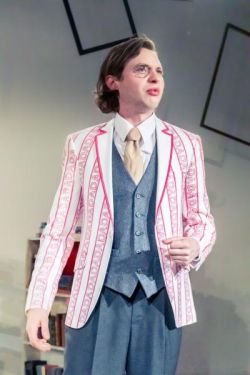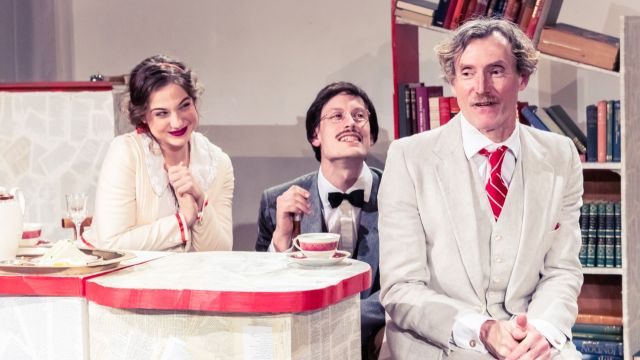Travesties
To quote the text, this may be nonsense, but it’s ‘clever nonsense’. Of course, Travesties is not nonsense at all. In an absurdist, witty, erudite and polemical fashion Tom Stoppard generates fast, funny and articulate debate among his characters about war, art and revolution – and, in passing, how we wish we could rewrite our own past. A serious play with a light, light touch.
The ostensible storyteller - or unreliable narrator - is Henry Carr (Dion Mills), a minor consulate official in Zurich in 1917 when WWI was in its third horrible year. Now grown old, Carr is trying to compose a memoir of that time in which three ‘revolutionaries – James Joyce (Johnathan Peck), Tristan Tzara (Matthew Connell) and Vladimir Lenin (Syd Brisbane) – were also in Zurich. A memoir Carr might perhaps call… ‘James Joyce As I Knew Him – A Sketch’. Or… But Carr has an unreliable memory, for reasons which become clear, but which enables Mr Stoppard to play certain incidents (that may or may not have actually occurred) over and over - and to mix up his reminiscences and fantasies with the amateur theatre production of The Importance of Being Earnest in which Carr played Algernon. That last, as well as Carr’s presence in 1917 Zurich, is historical fact – as is the (almost) contemporaneous presence of Joyce, Tzara and Lenin – but the rest of the play’s content is, well, strictly speaking, dubious. I should add that one’s enjoyment of Travesties is increased by at least 50% if one knows at least something about the period, its literature and these famous historical figures.
 It’s always interesting to see what directors and designers will do with the fortyfivedownstairs space. It’s one very large room with columns. This production closes off half the space and puts the audience on bleachers: it is curiously intimate. We are close to the actors and when they speak directly to us there is a real connection. There are affecting moments in Alex Blackwell’s lighting – for instance, when Carr remembers his time in the trenches at the Western Front (Stoppard does not completely make a joke of this). But mostly the lighting design is very bright, shadowless and straightforward. Jordan Stack’s set design doesn’t attempt ‘realism’ and instead suggests Carr’s sitting room and the Zurich public library – and gestures to a couple of other places. There are some musical and dance numbers that are, I feel, just that bit deliberately unpolished. Without wishing to be pejorative, were it not for the high calibre of the cast and their performances – and Rhiannon Irving’s excellent costumes – the show itself has the feel of ‘amateur theatricals’ – but that only increases the intimacy and enhances one’s enjoyment.
It’s always interesting to see what directors and designers will do with the fortyfivedownstairs space. It’s one very large room with columns. This production closes off half the space and puts the audience on bleachers: it is curiously intimate. We are close to the actors and when they speak directly to us there is a real connection. There are affecting moments in Alex Blackwell’s lighting – for instance, when Carr remembers his time in the trenches at the Western Front (Stoppard does not completely make a joke of this). But mostly the lighting design is very bright, shadowless and straightforward. Jordan Stack’s set design doesn’t attempt ‘realism’ and instead suggests Carr’s sitting room and the Zurich public library – and gestures to a couple of other places. There are some musical and dance numbers that are, I feel, just that bit deliberately unpolished. Without wishing to be pejorative, were it not for the high calibre of the cast and their performances – and Rhiannon Irving’s excellent costumes – the show itself has the feel of ‘amateur theatricals’ – but that only increases the intimacy and enhances one’s enjoyment.
The performances are energetic and spirited – at times, perhaps too much so. Director Jennifer Sarah Dean invents lively movement and business but seems to have asked for pace – and that becomes a touch manic and relentless. There’s a difference between pace and haste and at times everyone seems to be going far too fast, even garbling the precise and witty dialogue.
The ever-versatile Mr Mills has to carry the triple burden of Old Carr, Young Carr and Narrator. In this, he certainly endears himself to the audience, but he too might slow down just a tad and maybe not exhaust himself. Nevertheless, Mr Mills gets it absolutely right with Carr’s vanity, his obsession with tailoring and his obliviousness to the fact that he is nowhere near as smart as his butler.
That butler is Bennett (Tref Gare) and Mr Gare is an exception to the too-fast problem. Mr Gare is trained in physical theatre and it shows: he has a stately, po-faced presence, including during comedy routines. His participation – keeping time with his chest as the percussion section - in a musical sparring match between Carr’s sister Gwendolyn (Joanna Halliday) and librarian Cecily (Gabrielle Sing) is an inspired comic addition. I’ve a suspicion this particular bit of business is the invention of Mr Gare himself, fully encouraged by director Dean. (The names Gwendolyn and Cecily – from The Importance of Being Earnest - are one of the clearest instances of Carr’s muddling what he wishes had happened with what really did.) Another exception is Milijana Cancar as Krupskaya, Lenin’s wife, an all too brief role. Ms Cancar suggests depths of wisdom and experience with her expressive face, but also with some ‘light and shade’ and judicious pauses in her dialogue.
 Ms Sing’s librarian Cecily exhibits a schoolmarm hauteur in the first half but becomes fiery and definite in the second – as well as playing charmingly with the cliché of the ‘repressed’ but sensual bookworm. Ms Halliday’s Gwendolen is a standout and just right: diminutive, brisk, flirtatious and with a smile that goes from sweetly demure to seductive in a flash. Watch her play Joyce’s amanuensis as he dictates the famous final passage of Ulysses, Molly Bloom’s soliloquy (‘…and first I put my arms around him yes and drew him down to me so he could feel my breasts all perfume yes and his heart was going like mad and yes I said yes I will Yes’). Ms Halliday, all hot and bothered at this, is fresh, non-cliché sexy and very funny.
Ms Sing’s librarian Cecily exhibits a schoolmarm hauteur in the first half but becomes fiery and definite in the second – as well as playing charmingly with the cliché of the ‘repressed’ but sensual bookworm. Ms Halliday’s Gwendolen is a standout and just right: diminutive, brisk, flirtatious and with a smile that goes from sweetly demure to seductive in a flash. Watch her play Joyce’s amanuensis as he dictates the famous final passage of Ulysses, Molly Bloom’s soliloquy (‘…and first I put my arms around him yes and drew him down to me so he could feel my breasts all perfume yes and his heart was going like mad and yes I said yes I will Yes’). Ms Halliday, all hot and bothered at this, is fresh, non-cliché sexy and very funny.
Mr Connell as Tzara is likewise wonderful; he not only gets the Rumanian accent right (as far as I know!), he captures the manic energy, the conceit and idiotic iconoclastic dogmatism of Dada. Syd Brisbane’s Lenin, however, gives us the dogged seriousness of the man, but so far not the necessary authority of the Bolshevik leader. Johnathan Peck, as Joyce (the character no doubt that is the rationale for including the play in this year’s Bloomsday celebrations) seems – at least on opening night – hampered by his attempt at an Irish accent and his performance is stiff and tentative, even when the dialogue should give him certainty – such as when Joyce tells Tzara the latter is a no talent phoney.
These objections aside, and with the caveat of some prior knowledge, this production of this 1974 (!) play teems with ideas and laughter: it is great fun. You find yourself drawn in, attentive (you have to be), dazzled yet thoughtful, metaphorically panting by the end, and having had a very good time.
Michael Brindley
Photographer: Christa Hills.
Subscribe to our E-Newsletter, buy our latest print edition or find a Performing Arts book at Book Nook.

